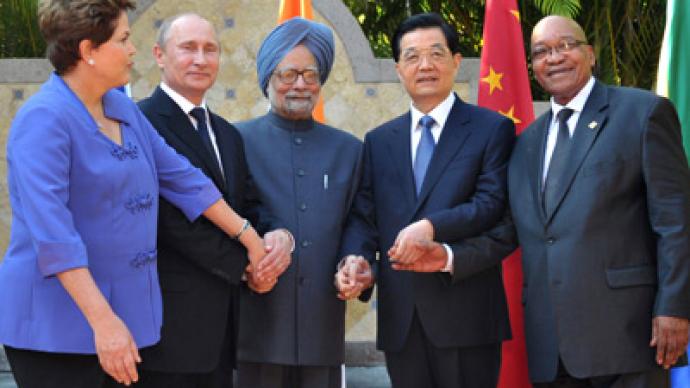“Emerging countries, including BRICS should play a bigger role in the world economy,” Russian President Vladimir Putin told the Petersburg International Economic Forum.
Russia, India, Brazil, China and South Africa are not only ready to help tackle the crisis, they have also undertaken financial commitments and are ready to inject $75 billion into the IMF, he said, clearly indicating an “intention to participate in the money allocation decision-making process”.Last week the BRICS pledged about $75 billion to the International Monetary Fund's global firewall against Europe’s debt crisis, adding to the IMF’s lending fund of $380 billion. China has offered $43 billion, while Brazil, Russia, India and Mexico promised $10 billion each. Meanwhile South Africa, Turkey, Colombia, Malaysia, New Zealand and the Philippines also promised smaller sums.With the contribution, BRICS nations renewed calls for greater voting power at the IMF and World Bank, adding that the money should only be used as a “second line of defense” when existing funds run out. Brazil even threatened to withhold its help, if Europe won’t provide BRICS with a bigger say at the IMF."These new contributions are being made in anticipation that all the reforms agreed upon in 2010 will be fully implemented in a timely manner, including a comprehensive reform of voting power and reform of quota shares," BRICS leaders said in a statement. “It is high time to reform the International Monetary Fund and other financial institutions,” added Putin. "It is necessary to raise the issue of upgrading trade and investment rules".
Russia's economy to get off oil hook?
President Putin said “budget rules will be adopted soon under which "neither state liabilities, nor budgetary expenditure, nor long-term investment programs will depend on oil prices, and excess profits will go to replenish funds.”Speaking at the forum earlier Finance Minister Anton Siluanov said that the government planned this year’s budget using an oil price of 115 dollars per barrel. And that level would have allowed a deficit-free budget. “But since prices weakened we estimated that with oil at 100 dollars per barrel Russia’s deficit will be 1.5 percent of GDP,” Siluanov added. “We currently expect crude to be at that 100 dollar level this year so we could probably see that deficit.”However, President Putin stressed that a deficit-free budget is not enough. “We need to diversify our economy away from total reliance on oil revenues, and turn to private capital as a source of growth,” he said. “Russia not only needs a deficit-free budget but a budget with a reserve of resilience.”Putin also said Russia as a strong country capable of battling another global economic crisis and is prepared to deal with any fallout from the euro zone's sovereign debt crisis.With some $80 billion leaving the country last year, Putin promised Russia would not impose any restrictions on capital flows. Putin also sought to reassure foreign investors that Russia was committed to liberal reforms and privatization.New privatizations must be fair and open with the state withdrawing from government assets, he said. At the same time, he stressed that privatization must not be carried out in the form of "loans-for-shares auctions or dubious deals when enterprises are bought at underestimated prices," which was typical of the 1990s. Privatization deals then saw some owners amass lucrative state assets for almost no money."Regrettably, but next to nothing has changed since then," he noted. "New privatizations should be accepted by society. It must be fair, open and transparent,” he said. This is the key condition to encourage efficient owners, who buy assets "not for the sake of holding for a while and subsequent selling," but who want to develop their businesses.”

